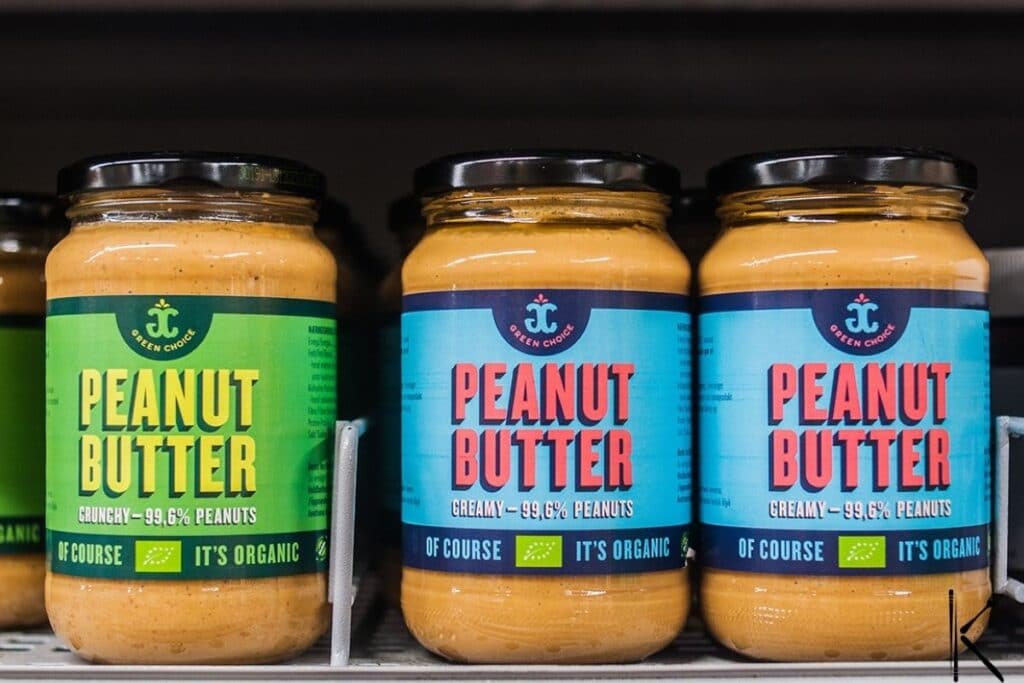Quick summary: Yes, peanut butter can go bad, and its shelf life varies based on the type of peanut butter. Signs of spoiled peanut butter include changes in texture, unpleasant smells or tastes, strange colors, and mold growth. To store peanut butter effectively, keep it in a cool, dark place, ensure the jar is tightly closed, and use a clean spoon to avoid contamination.
You’ve heard peanut butter is the longest-lasting among spreads, but you’re not really sure how long you can stretch it? We bring you everything you need to know about this favorite spread’s duration, correctness, and storage.
I believe there are not many people who say no to peanut butter. From the youngest to the oldest, this is truly a favorite breakfast around the world. Despite its high-fat content, this product has a lot of good sides, vitamins, and minerals present, and the fats in it are actually good. In moderate amounts, of course.
You already know how your peanut spread won’t spoil as quickly as the others. There’s not too much competition in that part, especially when talking about long shelf life on the kitchen counter and room temperature. But even this product cannot last forever no matter how much we wish.
How Long Does Peanut Butter Last?
When it comes to peanut butter, the most significant impact on its durability will be the way it is produced. Whether they have stabilizers present in them or not will indicate how long they can last.
So what is peanut butter’s shelf life? Here are tips for both types of butter by the time you open them and when you’ve already started using them.
Commercial Peanut Butter
It may not be the happiest word to label them as commercial because they are all intended for sale, but let’s say this is the largest group among peanut spreads. They are marked by a slightly lower proportion of peanuts themselves, but with added stabilizers such as palm oil and preservatives.
Duration of unopened jar will depend on the manufacturer but can range from six months to as much as two years. Once you have started the pack, the assumption is that the product will last for the next two to three months, maybe a little longer if you put it in the fridge.
Natural Peanut Butter
If you have a spread in front of you that is made chiefly only of peanuts with perhaps the addition of a bit of salt and some spices, then it is a product with a much shorter shelf life.
Again, the duration will depend on the manufacturer itself but will probably not be longer than six months unopened. Once you start using fresh peanut butter, it would be good to consume it within a month. It is definitely recommended to keep natural peanut butters in the fridge after opening.
Can Peanut Butter Go Bad?
Can it be spoiled? Yes, very much and with different kinds of spoilage. And to immediately solve the mystery you have, you can also get food poisoning from your favorite butter. Here’s how you’ll most easily recognize that the product is no longer edible.
Sign 1: The texture is not creamy anymore
In the fresh state, the peanut spread is creamy and has a smooth texture. If your conventional peanut butter is dry and stony, it has likely expired. Keep in mind here that if you keep the product in the fridge, it can, of course, be a bit firmer, but it will still have a constant texture when you take it out.
Sign 2: Something smells or tastes funky
In proper condition, the smell is pleasant, and the taste is delicately nutty. If any of this deviates, for example, the scent is a bit sour, the taste is rancid, or something like that, it’s time to throw away the product. Rancid peanut butter is not a pleasant meal.
Sign 3: The look is strange
Color changes may be visible in a spoiled peanut butter. A very dark brown color that is not common may appear. Or you will notice discoloration only on certain parts. All of this is a sure sign that you don’t need to eat that spread. Mold growth is also possible to sight. Some oil separation is quite possible if you store peanut butter in a bit warmer temperatures.
Which is the Best Way to Store Peanut Butter?
Now that you’ve learned how to recognize that a product is rotten, let’s see what you can do to keep it from spoilage. A few tips can help you retain your product fresh and suitable without requiring much effort from you.
Tip 1: Keep products in cool place
The most significant embargo is to leave the product in the sun. This will undoubtedly guarantee spoilage in record time. But also try to keep the butter in really cool places. A refrigerator would be ideal, but if you don’t like a product too hard, you can store it in a colder pantry staple in a dark place. This will prevent oil separation as well.
Tip 2: Keep the peanut butter jar well closed
Always keep the jar tightly closed and do not leave the open jar on the counter for a long time. Air will increase oxidation and diminish the quality of the spread itself.
Tip 3: Always use a clean spoon
This could be a problem for you if you like to eat peanut butter with a spoonful from a jar. However, double-dipping is not good because bacteria from your saliva can create preconditions for spoilage in the product. Also, do not let other types of food end up in the spread jar so as not to impair its stability.
FAQs
How long can you eat peanut butter after it expires?
You can safely consume peanut butter for a few months to a year past its expiration date if stored properly and if there are no signs of spoilage such as an off smell or unusual texture. Always use your judgment and sensory cues to assess its quality before consuming.
Can you get sick from eating old peanut butter?
Yes, if the product is rotten, you can get sick. May cause nausea, vomiting, and similar symptoms.
How can you tell if peanut butter has gone bad?
Signs that peanut butter has gone bad include a rancid or sour smell, a change in texture like becoming dry and crumbly or overly oily, and the presence of mold or an off-color. If you notice any of these characteristics, it’s best to discard the peanut butter.
Does peanut butter need to be refrigerated?
No, peanut butter does not need to be refrigerated, but refrigeration can extend its shelf life and prevent oil separation in natural or homemade peanut butter.
Is 2 year old flour still good?
Yes, if stored in proper conditions, unopened all-purpose flour that is two years old might still be usable, but check for signs of spoilage before using.
Conclusion
Peanut spread is an excellent start to the day. In addition to satiating you and giving you the energy you need, it will also supply you with good feelings because there’s nothing better than starting the day with something sweet. This butter is known for its relatively long shelf life because it has a high-fat content and a very low moisture content.
We advise you to keep it in the dark and cool place in the pantry while it is unopened. After that, despite not being mandatory, try to keep it in the refrigerator to extend its extremely long shelf life. If you notice any changes in color and texture, or the product has got a strange smell and taste, it’s time to go to the store for new stock.
See more:









